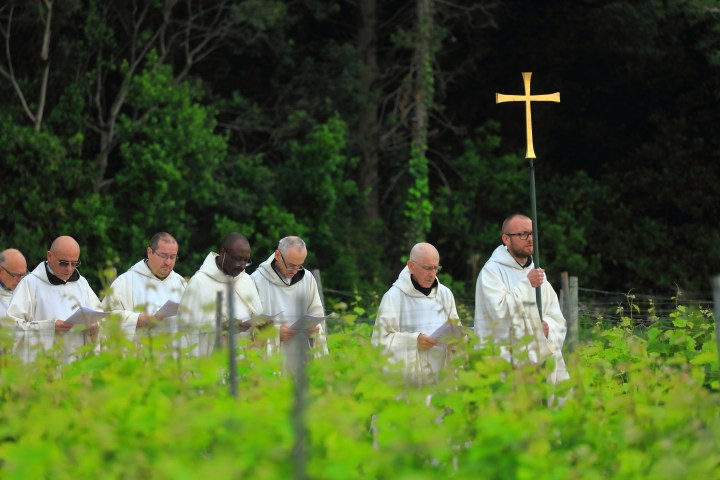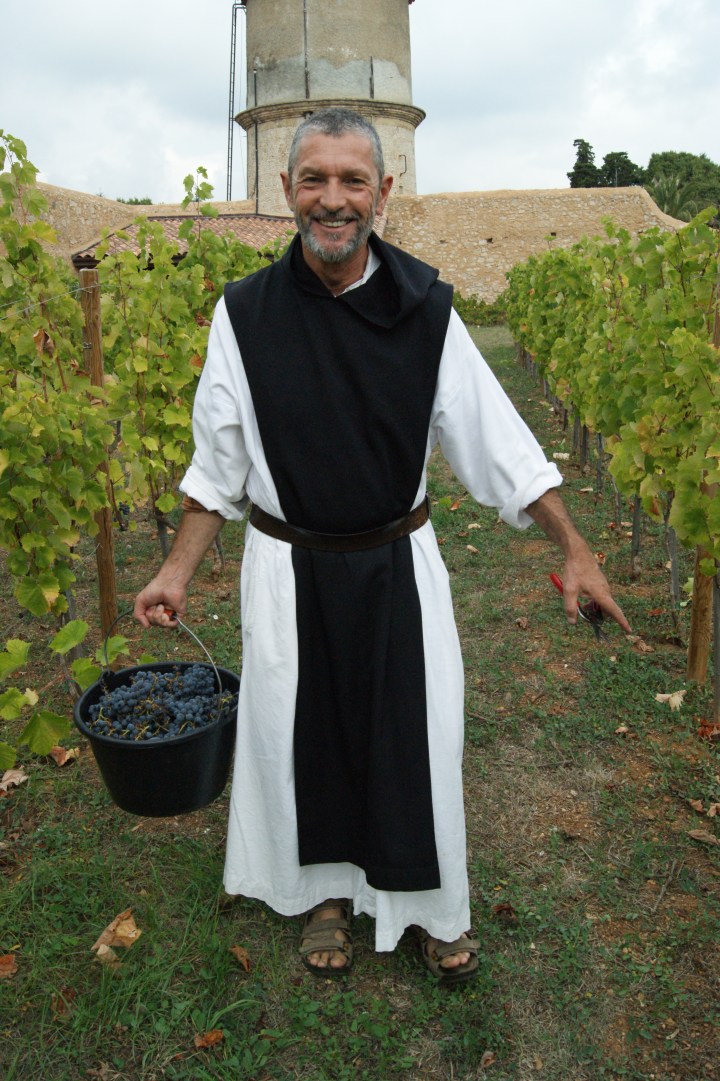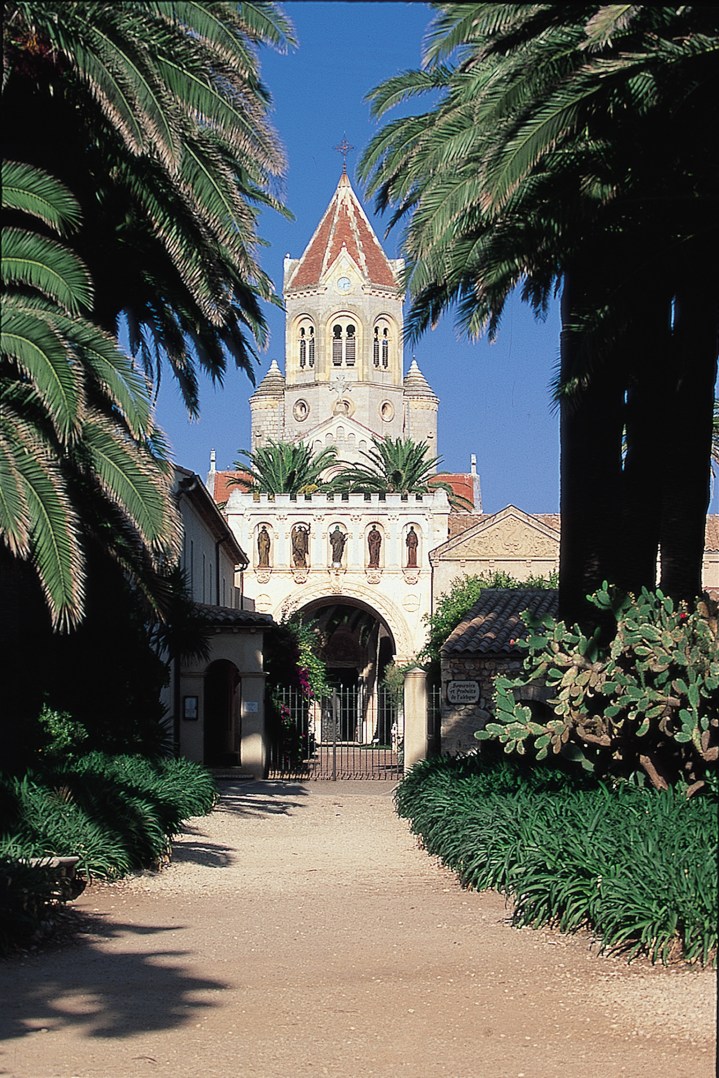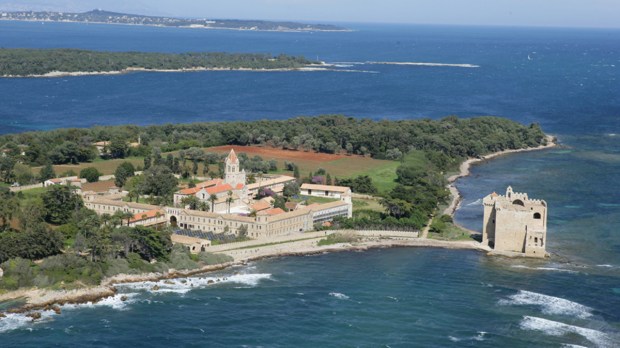A community of 21 monks lives on Île Saint-Honorat (St. Honoratus Island), a breathtakingly beautiful island in the heart of the Mediterranean. The community welcomes day visitors and retreatants to their preserved heritage, the 5th-century Abbaye de Lérins. The monks, aged between 37 and 90, come from different cultural backgrounds, living together and respecting the rule of St. Benedict based on prayer and work.

A historic monastic site
The island is only 1.5 kilometers long and 400 meters wide, but it is rich in history.
St. Honoratus arrived on this small island in 410 with his hermitage companion St. Caprais. The island offered solitude — just what St. Honoratus wanted. They set about building a monastery and were joined soon after by other monks, thus forming the first monastic community on the island. St. Honorat, the second-largest Lérin island situated off the coast of Cannes, was named after the saint.
Over the years, many cloisters and chapels were built. Today the island contains seven chapels, some facing the sea while others are inland.
The majestic fortified monastery tower on the southern shore, one of the island’s highlights, was built in stages, taking over three centuries to be fully completed.
The island suffered attacks and expulsions over the centuries and was even closed just before the French Revolution in 1787. Two hot-shot furnaces for heating cannon balls to hot temperatures still exist, a grim reminder of the Napoleonic wars when the French bays had to be protected.
In 1859 the bishop of Fréjus purchased the island from the State and donated it to the Cistercian monks.
Winemaking at St. Honorat
The monks tend to their 8 hectares of vines, enjoying perfect weather conditions and soil for their red and white grape varieties. Respecting nature is vital, and everything produced on the island is based on a sustainable approach.
Brother Marie, the cellar master explained:
“It’s very mild here, and we hardly have any winter. We have 220 days of sunshine per year and soil that’s a mixture of clay and limestone; it’s ideal for storing water and keeping the vines cool.
“We use a tractor to work the soil. We harvest manually to produce one-third white and two-thirds organic red wine. Most of our wine is exported to Japan, to France, and Belgium.
“Unfortunately, since the September 11 attack in New York, we no longer export to the USA,” he said.

The monks also make three different kinds of liqueurs and extra virgin olive oil obtained from 150 olive trees, most of them a century old.
Conscious of the need for a more sustainable planet, the monks have embarked on a new project — permaculture agriculture for growing vegetables.
Brother Marie explained that the island receives water from the mountains above Cannes thanks to an underground pipe, a definite advantage to this venture.
Retreat on St. Honorat
St. Honorat offers an inviting place to spend a couple of days away from the stress and strain of everyday living, work overload, and noise. The serenity and peace allow retreatants a time to reflect and reconnect with God.
Evelyne Cassou, who has been volunteering her services at the Abbey for 15 years, helps the monks welcome retreatants.
She observes:
“Taking time out for a retreat can be a little tense for many people. They are plunging into the unknown. I welcome them, and when a smile appears, it makes me happy. The contact is established, they are ready to receive the benefits of their stay.
“We welcome all kinds of people here; they come with their sorrows others with joys. At reception, we are their first physical contact with the Abbey it is our responsibility to listen to their needs.”
Honorat Island is the perfect prescription for unwinding, with leisurely walks in clean air while admiring the many rocky beaches and creeks. Trees and flowers surround the main church in a beautiful Mediterranean setting, but the church interior remains simple.

Retreatants can share prayers with the community throughout the day: from the Lauds (praise) at the start of the day to the evening recital of Compline, as well as mid-morning Mass.
Retreatants observe silence at mealtimes and help with light domestic duties in “simplicity and joy.”
Peace and quiet prevail on this tiny island.
Evelyne Cassou, who volunteers a week at a time, says she’s lucky to spend a few weeks a year at the Abbey.
“It’s is part of my path, my evolution,” she said.
“I have the feeling of growing, of blossoming spiritually in contact with the Abbey every time I’m on the island. I have so much pleasure seeing the retreatants leave calm and happy with their stay. I know then that I am in my place.”

